Pigs are a valuable source of food and income, but their waste can negatively impact the environment if not managed properly. Pig waste often contains high levels of nutrients such as nitrogen, phosphorus, and potassium, which can cause water pollution when it enters bodies of water. Proper waste management techniques can help reduce the environmental impacts of pig farming while also providing economic benefits through using pig manure.
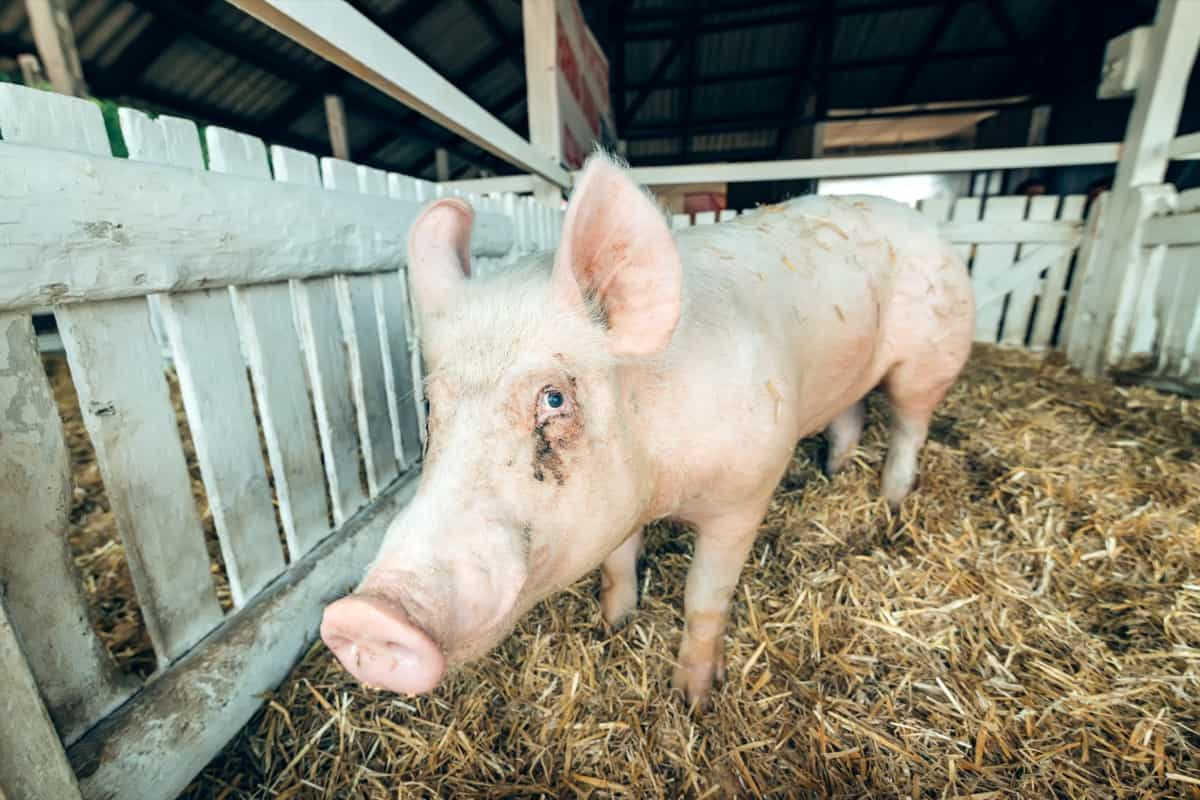
Farmers must select a suitable strategy that disposes of swine waste properly and utilizes it to enhance productivity. Pig farming is an essential industry contributing to the world’s food supply and generating massive waste. If not properly managed, pig manure can lead to pollution, contamination of water sources, and soil degradation. However, there are sustainable ways to manage pig waste and utilize it as a valuable resource. Let’s check out more information on pig waste management below.
What is Pig Waste Management?
- Pig waste refers to the organic matter that pigs excrete. It consists of feces, urine, leftover feed, and bedding materials. The amount of waste a pig produces varies depending on weight, age, and diet.
- The composition of pig waste differs from other types of animal waste due to its high nitrogen content. In addition to nitrogen compounds, pig waste also contains phosphorus and trace elements like zinc and copper, which can be toxic at high concentrations.
- Waste management has become a critical issue in pig farming due to the increasing amount of waste these animals produce. Pig manure contains high levels of nutrients, including nitrogen and phosphorus.
- Traditional methods for managing swine waste involve storing it in lagoons prone to leaking and contaminating groundwater resources. A more sustainable solution is composting the manure into organic fertilizer that can be used as soil amendment for crops or sold commercially.
- Composting involves mixing manure with other organic materials, such as straw or sawdust, then allowing it to decompose over time. This process reduces pathogens, eliminates odors, and produces a valuable resource that improves soil quality while reducing reliance on synthetic fertilizers.
- Another approach is utilizing anaerobic digestion systems, which capture methane gas from decomposing pig manure. The captured methane gas can be used as an alternative source of energy.
- Pig waste management is a crucial issue that requires immediate attention to prevent further environmental damage and health hazards. The livestock industry must work towards sustainable solutions for managing pig manure efficiently without compromising the environment’s well-being. Effective waste management practices are essential for ensuring the sustainability of pig farming operations while protecting public health and the environment.
In case you missed it: How to Build a Low-cost Pig House: DIY Steps, Barn Design, Shed Requirements, and Cheap Ideas
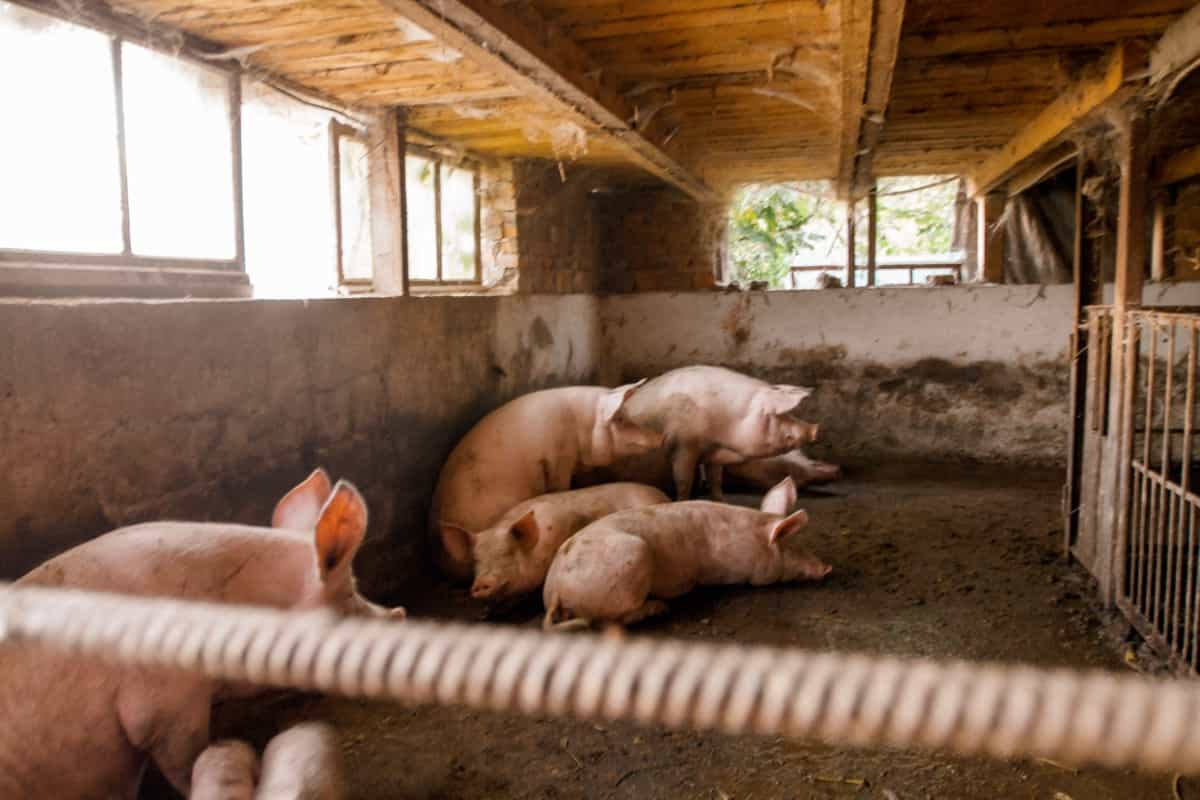
Different Methods of Pig Waste Management
One common method is lagoon systems, which involve storing the manure in large open-air ponds. This allows for the natural breakdown of the manure through anaerobic digestion, but it can also lead to odor issues and potential pollution if not properly managed. These lagoons are cost-effective and can store a large amount of manure, reducing the frequency of removal. They need regular maintenance to prevent leaks or other environmental hazards.
Another method is composting, where the manure is mixed with organic materials, such as straw or sawdust, to create a nutrient-rich soil amendment. Composting requires careful monitoring of temperature and moisture levels to ensure proper decomposition. Anaerobic digestion is another option that uses microorganisms to break down the waste in an oxygen-free environment, producing biogas as a byproduct that can be used for energy production. This method has high capital costs but can provide economic benefits over time.
The land application involves spreading manure onto fields as fertilizer, providing valuable nutrients while reducing disposal costs. This must be done carefully to avoid over-application and potential runoff into water sources. Proper handling of pig waste ensures minimal impact on human health and environmental safety while creating opportunities for farmers to generate extra revenue streams through innovative solutions such as energy generation from biogas or producing high-value fertilizers from animal wastes without relying solely on synthetic chemical inputs.
To implement these methods effectively, it’s important to have proper infrastructure, such as compost bins or an anaerobic digester system, in place. Additionally, regular maintenance and monitoring of these systems are crucial for optimal performance. By implementing sustainable pig waste management practices on their farms, farmers can reduce environmental impacts while creating economic opportunities by producing valuable resources like compost or biogas.
Implementing this method on your farm can reduce environmental pollution, enhance nutrient cycling, and generate renewable energy sources. You can use composted manure to enrich your soil or sell it as organic fertilizer to other farmers. You can also invest in biogas technology which converts pig waste into electricity or heat for household or industrial purposes. Sustainable management of pig waste requires a shift in mindset from viewing it as a liability to recognizing its potential value in creating a circular economy.
By adopting best practices for treating and utilizing pig waste, you can contribute towards building a more resilient and regenerative food system for future generations. Pig waste management is an essential aspect of sustainable agriculture. It ensures the health and well-being of pigs, protects the environment, and promotes soil fertility. The different methods of pig waste management have their advantages, but sustainable manure utilization stands out as the most eco-friendly approach.
In case you missed it: Pig Farming in Zimbabwe: Step-by-Step Starting Guide, Business Plan, Breeds, Setup Cost, and Profit
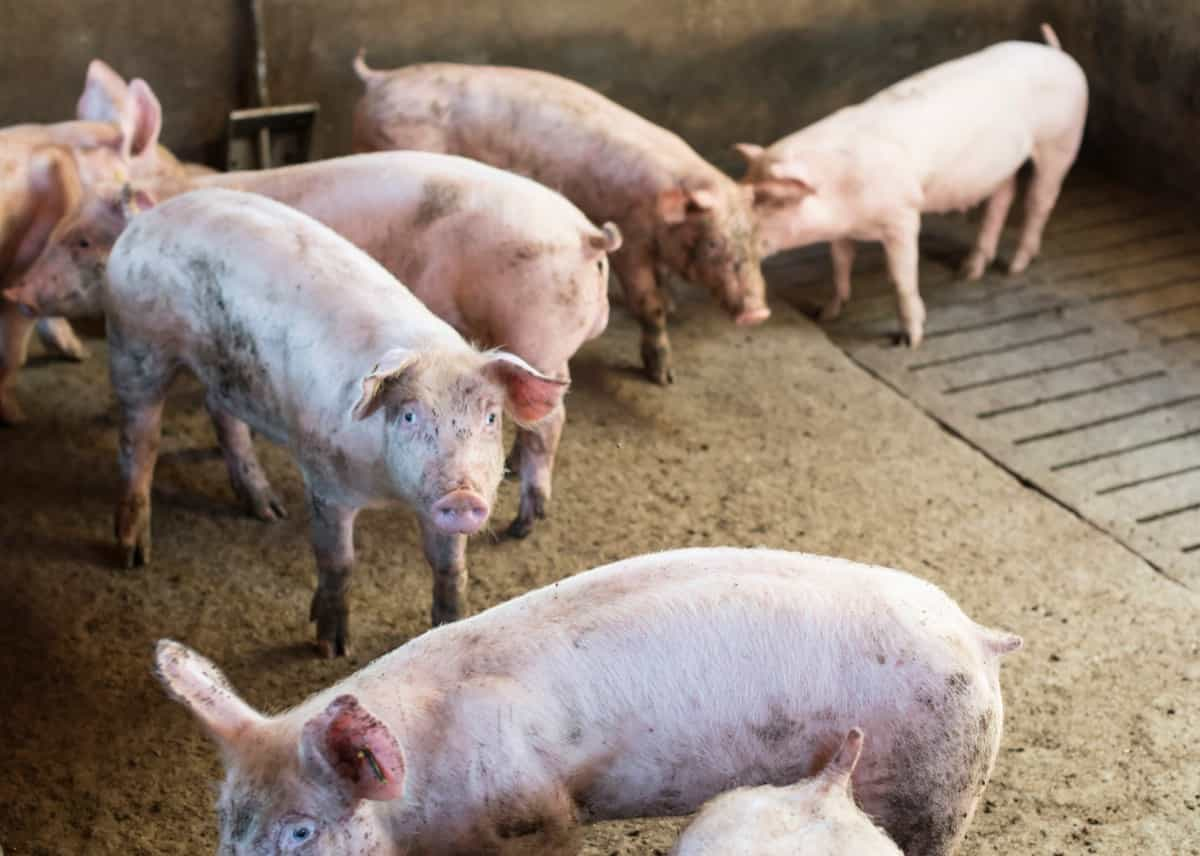
What Is the Purpose of Pig Manure?
Pig manure is a valuable resource that can be used in various ways. Firstly, it is a nutrient-rich fertilizer for crops and plants due to its high nitrogen, phosphorus, and potassium content. This helps improve soil quality and crop yields. In addition to fertilization, pig manure can be used as an energy source through methane production.
Methane gas can be extracted from the manure using anaerobic digestion systems, which convert the waste into biogas that can be used for heating or electricity generation. Moreover, utilizing pig manure has environmental benefits such as reducing greenhouse gas emissions and improving water quality by preventing contamination of nearby bodies of water with excess nutrients from untreated waste.
Pig manure has multiple uses beyond being just a waste product. It’s important to properly manage this resource sustainably, which benefits both agricultural practices and environmental sustainability efforts. Effective management strategies for pig waste include proper storage and handling techniques to prevent spills or leaks into nearby water sources. This involves using containment structures like lagoons or tanks, allowing controlled release and application onto land.
Manure utilization is becoming an increasingly important topic in the agriculture industry. Effective pig waste management requires a holistic approach considering production efficiency and environmental sustainability. When done correctly, it can help protect natural resources while improving farm profitability in the long run.
Selection of Pig Manure Management Strategies
- There are several strategies that farmers can implement. The selection of the appropriate strategy will depend on different factors like local regulations, the size of the farm, and available resources.
- One main strategy is solid-liquid separation. This method involves mechanically separating the solids from liquids in pig waste. It reduces odors and greenhouse gas emissions, making it easier to transport and apply as fertilizer.
- Another strategy is composting, which involves mixing pig manure with other organic materials like straw or leaves to create a nutrient-rich soil amendment. Composting not only helps reduce odor but also kills harmful pathogens present in manure.
- The next strategy is anaerobic digestion, which converts pig waste into biogas that can be used for energy production. The leftover material then becomes a high-quality fertilizer without any offensive odor.
- Some farms may choose land application as their primary method for managing pig manure. This practice involves applying liquid or solid waste directly onto fields where crops are grown for nutrient supplementation.
In case you missed it: Key Rules to Improve Feed Conversion Ratio (FCR) in Pigs: For Better Profits in Pig Farming
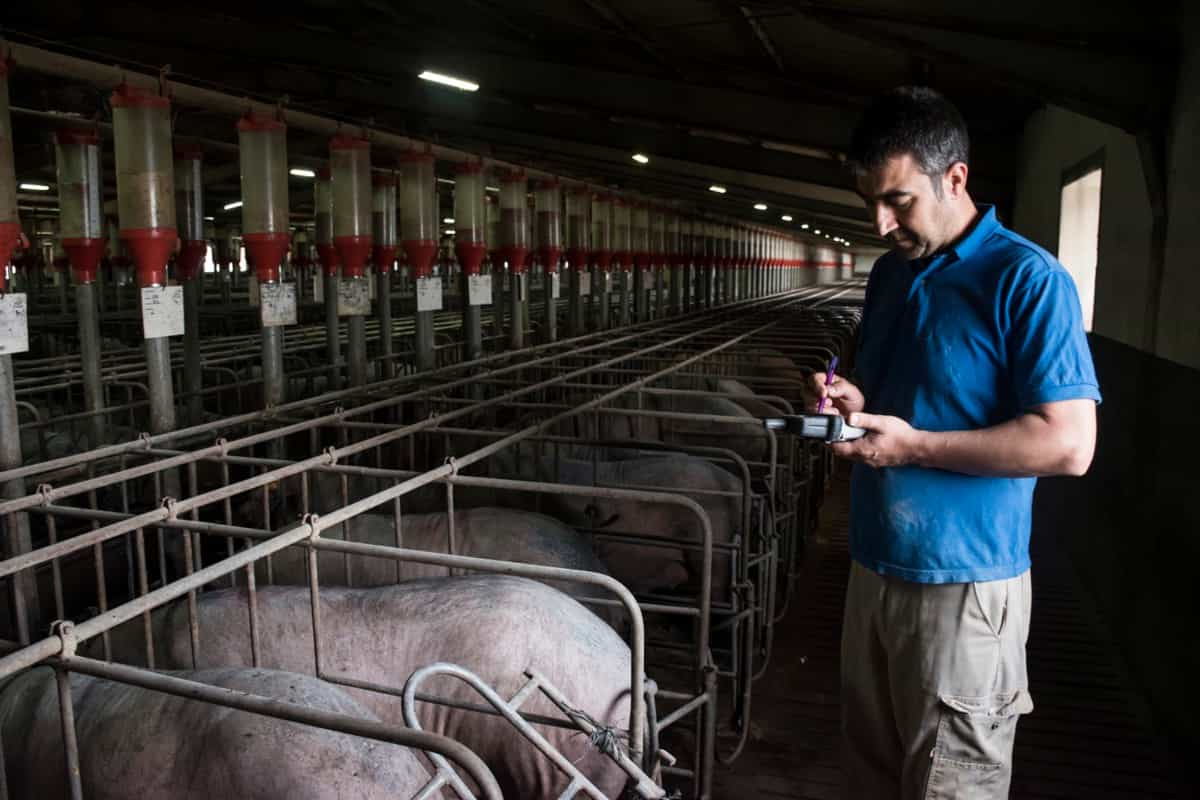
- Pig manure utilization is focused on using it as fertilizer for soil and treating raw and digested manure. Several methods, such as composting, anaerobic digestion, and nutrient recovery systems, can convert swine waste into valuable resources that benefit agricultural operations.
- Therefore, by utilizing innovative solutions for sustainable pig manure management, farmers can contribute positively towards reducing greenhouse gas emissions whilst improving crop yields. As such, policymakers need to support sustainable agriculture practices in order to drive environmentally conscious food production practices forward.
- Utilizing pig waste sustainably offers both environmental and economic benefits. Farmers who adopt these practices contribute towards sustainable agriculture while optimizing their operations’ efficiency and productivity.
What is the Strategic Use of Pig Manure?
- Pig manure has long been recognized as a valuable resource for agriculture due to its high nutrient content. The most common way to utilize pig manure is through liquid pig manure (LPM) fertilization.
- LPM is rich in nitrogen, phosphorus, and potassium, essential nutrients for plant growth. When applied correctly, LPM can help improve soil fertility and crop yields while reducing the need for chemical fertilizers.
- The strategic use of LPM involves careful planning and management to ensure that it is used effectively without causing environmental harm. Farmers must calculate the appropriate amount of LPM based on soil type, crop requirements, and weather conditions.
- Farmers should only apply LPM when crops are actively growing and avoid application during heavy rain events or near surface water sources to prevent runoff into nearby bodies of water. Additionally, regular soil testing can help monitor nutrient levels and prevent over-application.
In case you missed it: Best Fertilizer for Maize: Organic, NPK, Compost Manure, and Schedule
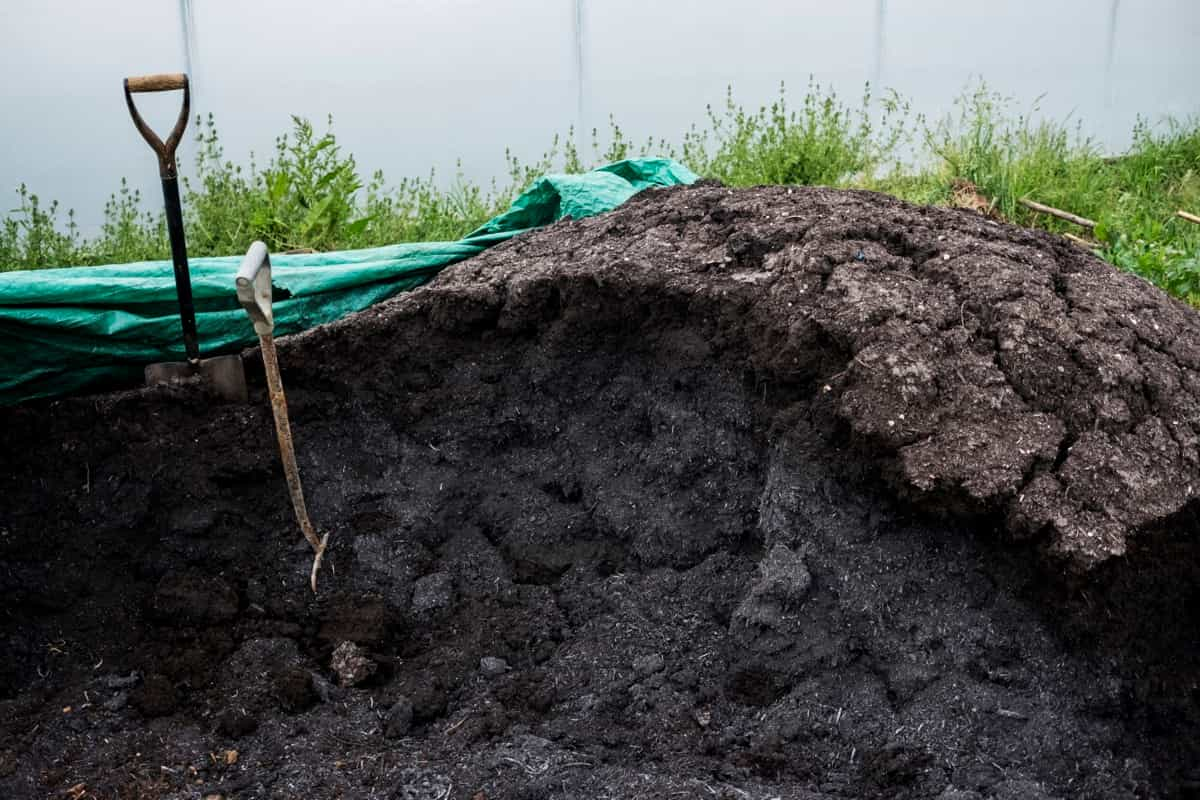
What are the Benefits of Sustainable Manure Utilization in Pigs?
Sustainable manure utilization offers a range of benefits to both the environment and farmers. The benefit is that it helps reduce greenhouse gas emissions, which contribute significantly to climate change. By managing pig waste sustainably, use it as a renewable energy source, reducing our dependence on fossil fuels. Another benefit is improved soil health and fertility. Pig manure contains essential nutrients like nitrogen, phosphorus, and potassium for plant growth.
When used as fertilizer, these nutrients enrich the soil with organic matter and help improve crop yields. Sustainable manure management also reduces water pollution by preventing nutrient runoff into nearby water bodies. This helps protect aquatic ecosystems from harmful algal blooms caused by water excess nutrients. Moreover, sustainable pig waste management practices promote circular economy models where waste products become valuable resources.
Methods for Sustainable Manure Utilization in Pigs
- It is the practice of utilizing pig waste in an environmentally friendly and sustainable manner. There are various ways to use pig manure sustainably on farms while reducing environmental impact and improving soil health. Each has its benefits depending on factors such as farm size, resources available, etc. It’s essential for farmers to choose their approach carefully based on what works best for their specific circumstances while ensuring sustainable management practices are followed at all times.
- One way of doing this is through composting, a process by which organic materials like pig manure are decomposed and turned into nutrient-rich soil. Composting reduces waste and improves soil health, making it more fertile for crops.
- Another method of sustainable manure utilization is anaerobic digestion, a process that breaks down pig waste without oxygen to produce biogas and fertilizer. Biogas can be used as source of renewable energy, while the fertilizer produced can be used in farming operations.
- Furthermore, incorporating cover crops like legumes into crop rotations can help mitigate the environmental impact of pig manure on surrounding ecosystems. Leguminous plants have nitrogen-fixing abilities, which reduce reliance on synthetic fertilizers. These practices offer multiple benefits, including reducing waste, improving soil quality, and providing renewable energy sources while mitigating negative environmental impacts.
In case you missed it: Poultry Farming in Israel: Key Rules, Business Plan, Breeds, Cost, and Profit
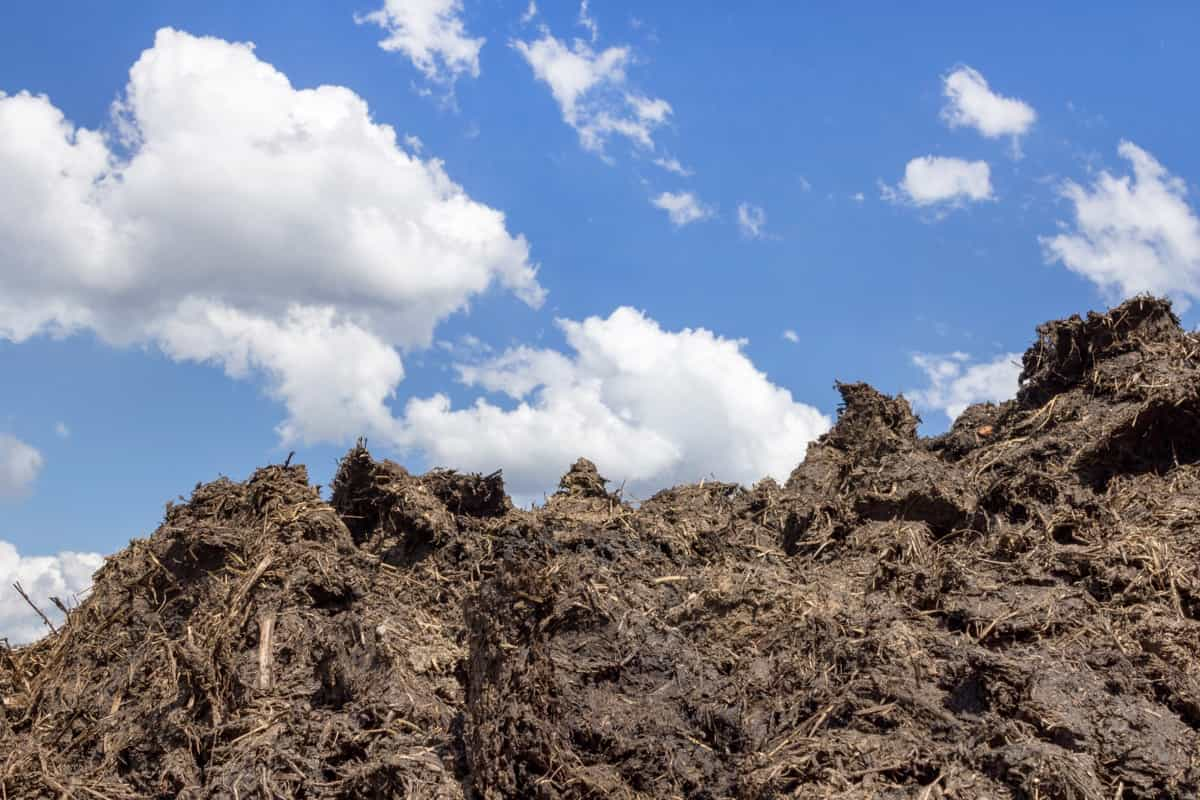
- Another method is composting pig manure with other organic matter, such as leaves or straws. This creates a nutrient-rich soil amendment that improves soil quality and provides slow-release nutrients for plants.
- In addition to these traditional uses, new technologies are emerging for treating pig waste further. These include anaerobic digestion systems that turn waste into biogas or electricity through microbial breakdown.
- Pig waste can also be processed into pellets, transported, and stored as fuel or fertilizer for later use. The pellets reduce odors and make it easier to handle the waste without causing pollution.
- Proper management and utilization of pig manure can help reduce environmental impacts while providing economic benefits through more efficient use of resources. It’s crucial to explore different opportunities for sustainable utilization based on local conditions and regulations.
Conclusion
Pig waste management is a crucial aspect of sustainable agriculture. Proper treatment and utilization of pig manure can help reduce greenhouse gas emissions, protect water quality, and improve soil health. Farmers can turn what was once considered a waste product into a valuable resource by adopting sustainable manure utilization practices such as composting or biogas production.
- Types of Pesticides Used in Agriculture: A Beginner’s Guide
- Economical Aquaculture: A Guide to Low-Budget Fish Farming
- 15 Common Planting Errors That Can Doom Your Fruit Trees
- How to Make Houseplants Bushy: Effective Tips and Ideas
- Innovative Strategies for Boosting Coconut Pollination and Yield
- Pollination Strategies for Maximum Pumpkin Yield
- The Complete Guide to Chicken Fattening: Strategies for Maximum Growth
- Natural Solutions for Tulip Problems: 100% Effective Remedies for Leaf and Bulb-Related Issues
- Revolutionizing Citrus Preservation: Towards a Healthier, Greener Future
- Natural Solutions for Peony Leaf and Flower Problems: 100% Effective Remedies
- Maximizing Profits with Avocado Contract Farming in India: A Comprehensive Guide
- Natural Solutions for Hydrangea Problems: 100% Effective Remedies for Leaf and Flowers
- The Ultimate Guide to Choosing the Perfect Foliage Friend: Bringing Life Indoors
- From Sunlight to Sustainability: 15 Ways to Use Solar Technology in Agriculture
- The Ultimate Guide to Dong Tao Chicken: Exploring from History to Raising
- The Eco-Friendly Makeover: How to Convert Your Unused Swimming Pool into a Fish Pond
- Mastering the Art of Delaware Chicken Farming: Essentials for Healthy Backyard Flocks
- 20 Best Homemade Fertilizers for Money Plant: DIY Recipes and Application Methods
- How to Craft a Comprehensive Free-Range Chicken Farming Business Plan
- Brighten Your Flock: Raising Easter Egger Chickens for Beauty and Bounty
- How to Optimize Your Poultry Egg Farm Business Plan with These Strategies
- Subsidy for Spirulina Cultivation: How Indian Government Schemes Encouraging Spirulina Farmers
- Ultimate Guide to Raising Dominique Chickens: Breeding, Feeding, Egg-Production, and Care
- Mastering the Art of Raising Jersey Giant Chickens: Care, Feeding, and More
- Ultimate Guide to Raising Legbar Chickens: Breeding, Farming Practices, Diet, Egg-Production
- How to Raise Welsummer Chickens: A Comprehensive Guide for Beginners
- How to Protect Indoor Plants in Winter: A Comprehensive Guide
- Ultimate Guide to Grow Bag Gardening: Tips, Tricks, and Planting Ideas for Urban Gardeners
- Guide to Lotus Cultivation: How to Propagate, Plant, Grow, Care, Cost, and Profit
- Agriculture Drone Subsidy Scheme: Government Kisan Subsidy, License, and How to Apply Online
- Ultimate Guide to Raising Araucana Chickens: Breed Profile, Farming Economics, Diet, and Care
- Bringing Hydroponics to Classroom: Importance, Benefits of Learning for School Students
- Ultimate Guide to Raising Polish Chickens: Breed Profile, Farming Economics, Diet, and Care
- Ultimate Guide to Raising Australorp Chickens: Profile, Farming Economics, Egg Production, Diet, and Care
- Silkie Chicken Farming: Raising Practices, Varieties, Egg Production, Diet, and Care
- Sussex Chicken Farming: Raising Practices, Varieties, Egg Production, Diet and Care